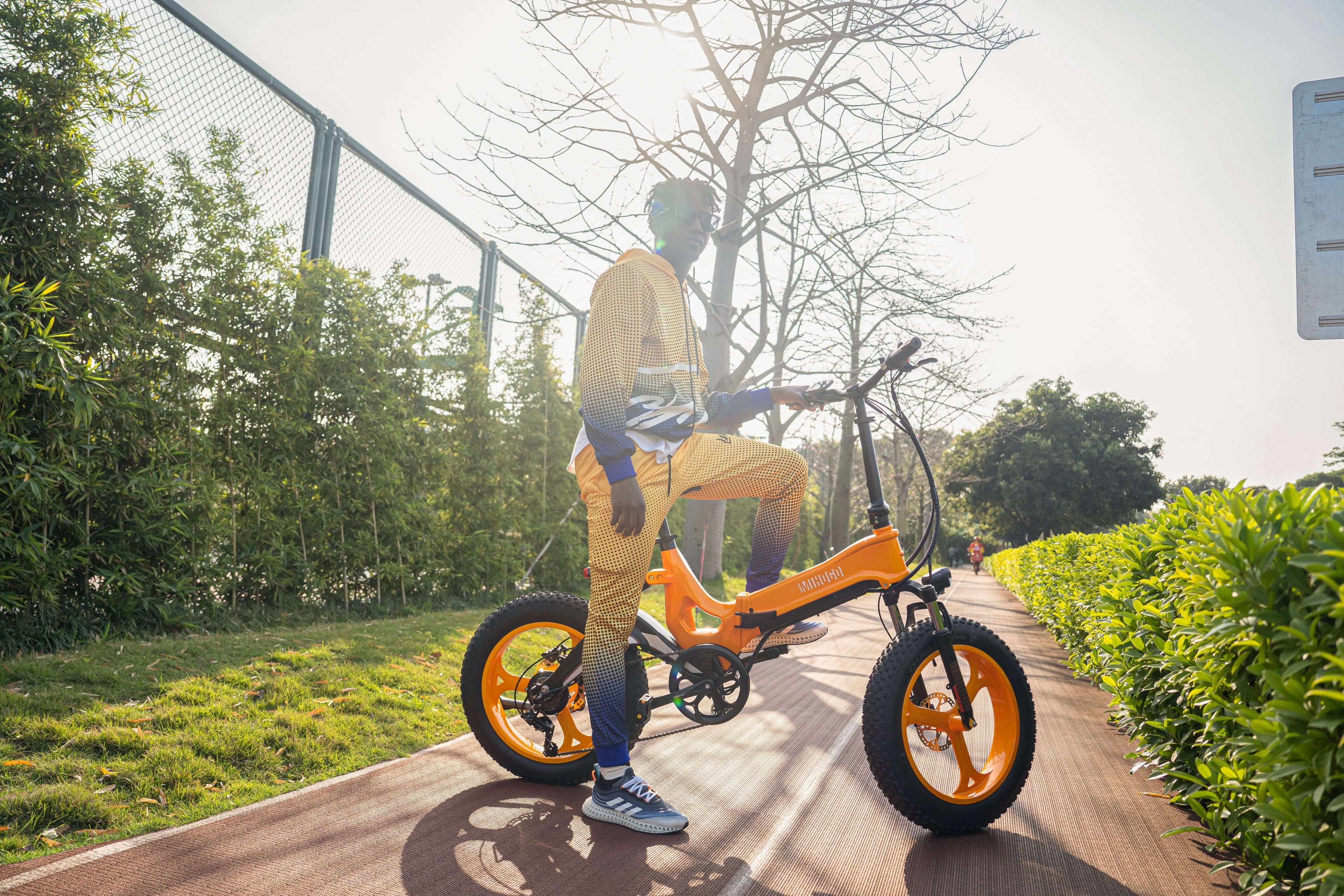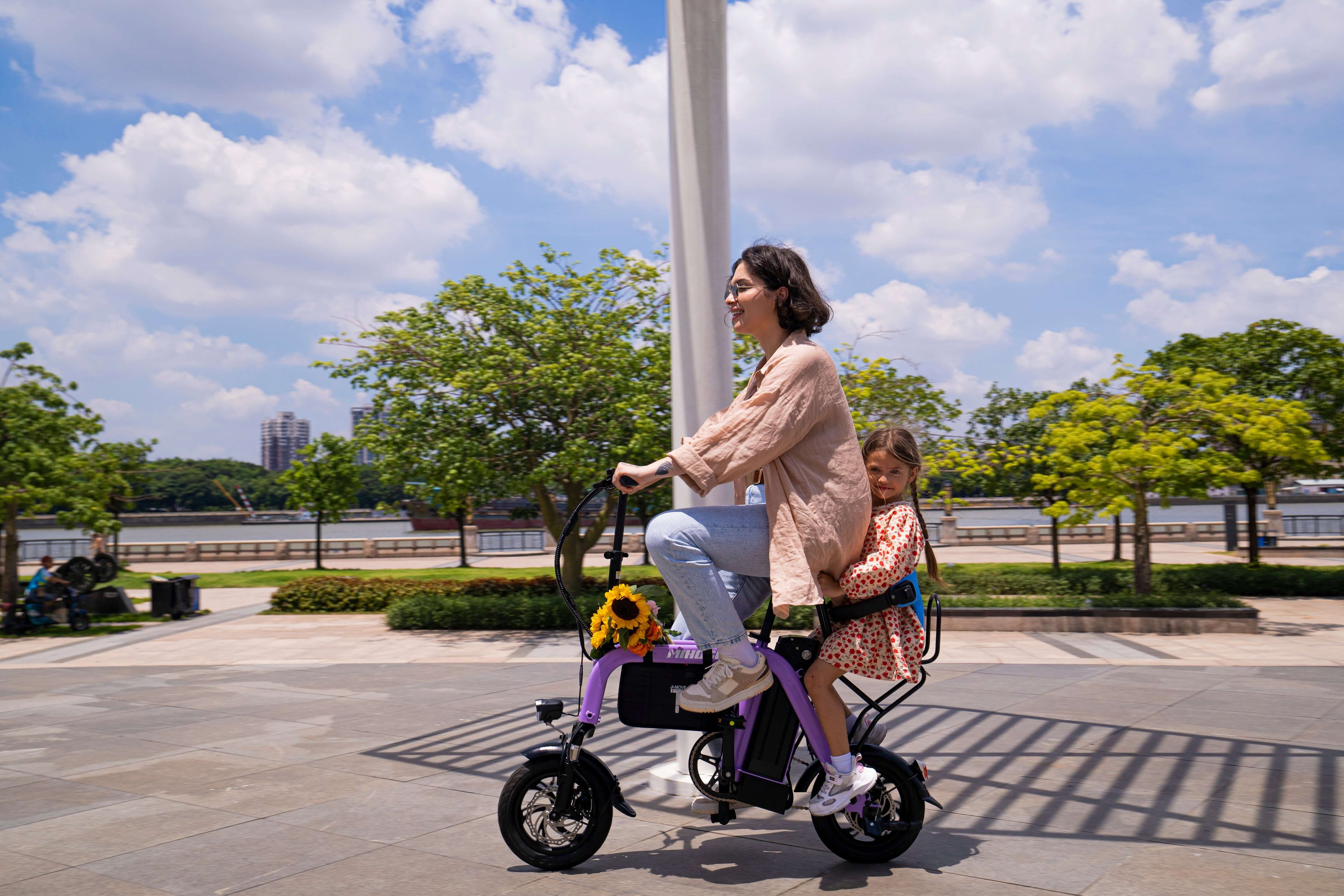How Do Electric Bikes Work?
Electric bikes use rechargeable batteries and typically are motor-powered up to 25 to 32 km/h (16 to 20 mph). High-powered varieties can often travel up to or more than 45 km/h (28 mph) depending on the model and riding conditions.
Core Components of Every E-bike
Every electric bike contains these essential components:
Electric Motor
The motor is the heart of your e-bike's power system. Mihogo's motor specifications deliver exceptional performance:
- Air750 Max: 750W high-performance motor for premium riding
- ONE Utility: 750W heavy-duty motor designed for cargo and extended use
- RX 2.4: 500W efficient motor perfect for daily commuting
- Mini: 350W compact motor ideal for urban mobility
Rechargeable Battery System
Watt-hours (Wh) is a measure of overall battery capacity. Higher Wh batteries are larger and heavier but last longer. Our Mihogo models offer impressive range capabilities:
- Air750 Max: 121-mile range with advanced carbon fiber construction
- ONE Utility: Industry-leading 167-mile range for maximum versatility
- RX 2.4: 40-mile range optimized for folding convenience
- Mini: 62-mile range in an ultra-compact design
Pedal Assist System
Most e-bikes come with a power switch that lets you adjust the boost setting from "eco" (low) to "turbo" (high), for when you want a little more oomph to help you, say, up a steep hill. This intelligent system responds to your pedaling effort, providing seamless assistance.
Control Display
All Mihogo e-bikes feature intuitive displays that show battery level, speed, distance traveled, and assistance mode selection.
Types of Electric Bike Motors
Understanding motor placement helps you choose the right e-bike for your needs:
Hub Motors
Hub motors are integrated into the wheel hub and provide direct power to the wheel. They're simpler in design and often more affordable.
Mid-Drive Motors
The main advantage mid-drive motors have over hub motors is that power is applied through the chain (or belt) and thus it uses the existing rear gears (either external or internal). This allows for the motor to operate more efficiently at a wider range of vehicle speeds.
Mihogo E-bike Model Breakdown
Air750 Max Carbon Fiber E-bike
- Type: Premium carbon fiber performance bike
- Motor Power: 750W for exceptional hill-climbing ability
- Range: 121 miles of extended riding
- Top Speed: 25 MPH for efficient commuting
- Size Range: 5'7" to 6'10" rider height compatibility
- Special Features: Lightweight carbon fiber construction, premium components
ONE Utility E-bike
- Type: Heavy-duty utility bike for versatile use
- Motor Power: 750W robust motor system
- Range: 167 miles – our longest-range model
- Top Speed: 25 MPH consistent performance
- Size Range: 5'7" to 6'10" accommodating various riders
- Special Features: Enhanced cargo capacity, reinforced frame design
RX 2.4 Folding Commuter
- Type: Convenient folding design for urban mobility
- Motor Power: 500W efficient commuter motor
- Range: 40 miles perfect for daily commuting
- Top Speed: 23 MPH optimized for city riding
- Size Range: 5'3" to 6'5" versatile fit
- Special Features: Compact folding mechanism, easy storage and transport
Mini E-bike
- Type: Ultra-compact urban mobility solution
- Motor Power: 350W lightweight motor
- Range: 62 miles impressive for its size
- Top Speed: 21.9 MPH efficient urban speeds
- Size Range: 5'1" to 6'4" inclusive design
- Special Features: Minimal storage footprint, lightweight portability
Understanding E-bike Battery Technology
Battery capacity refers to the amount of energy that can be stored in an ebike's battery pack. Typically measured in watt-hours (Wh), a higher battery capacity means more power and longer ride distances.
Mihogo Battery Advantages
- Removable Design: Easy charging and security
- Advanced Battery Management: Optimized performance and longevity
- Fast Charging Capability: Minimize downtime between rides
- Temperature Protection: Safe operation in various weather conditions
E-bike Classification and Legal Considerations
Depending on local laws, many e-bikes (e.g., pedelecs) are legally classified as bicycles rather than mopeds or motorcycles. This exempts them from the more stringent laws regarding the certification and operation of more powerful two-wheelers.
Understanding electric bicycle regulations helps ensure compliance with local laws and safe operation.
Class Definitions
- Class 1: Pedal-assist only, no throttle, 20 mph max
- Class 2: Pedal-assist and throttle, 20 mph max
- Class 3: Pedal-assist only, 28 mph max
Benefits of Electric Bike Technology
Environmental Impact
E-bikes represent an emerging sustainable mode of transport for future smart cities, offering significantly lower carbon emissions compared to traditional vehicles.
Health and Fitness
By making the biking terrain less of an issue, people who would not otherwise consider biking can use the electric assistance when needed and otherwise pedal as they are able.
Economic Advantages
- Reduced transportation costs
- Minimal maintenance requirements
- No fuel expenses
- Lower insurance costs compared to motorcycles or cars
Practical Benefits
Getting an e-bike can dramatically increase how often you ride, according to a survey of nearly 1,800 e-bike owners in North America. Beforehand, 55 percent of respondents said they rode daily or weekly. After buying an e-bike, that number soared to 91 percent.
Choosing the Right Mihogo E-bike
For Daily Commuting
The RX 2.4 Folding Commuter offers the perfect balance of performance and convenience for urban professionals who need reliable, efficient transportation with easy storage capabilities.
For Premium Performance
The Air750 Max Carbon Fiber delivers unmatched performance with its lightweight construction, powerful 750W motor, and industry-leading 121-mile range.
For Heavy-Duty Use
The ONE Utility provides maximum versatility with its robust 750W motor and exceptional 167-mile range, perfect for cargo hauling and extended adventures.
For Compact Urban Mobility
The Mini offers an ultra-compact solution without sacrificing range, delivering 62 miles of riding in a space-efficient design.
E-bike Maintenance and Care
Motor torque is another critical term when discussing ebike functionality. Torque refers to the rotational force generated by the motor. In an electric bicycle, motor torque determines how efficiently the bike can climb steep hills or accelerate from a standstill.
Regular maintenance ensures optimal performance:
- Battery care and proper charging cycles
- Motor system inspection
- Brake system maintenance
- Tire pressure monitoring
- Chain lubrication and drivetrain care
For comprehensive maintenance guidance, visit our detailed Mihogo maintenance schedule guide.
The Future of Electric Mobility
Electric bikes continue evolving with advancing technology, improved battery efficiency, and enhanced smart features. As urban areas prioritize sustainable transportation, e-bikes represent a crucial component of future mobility solutions.
Understanding how sustainable transportation technologies impact urban planning helps appreciate the broader significance of electric bike adoption.
Conclusion: Your Electric Bike Journey Starts Here
Electric bikes combine traditional cycling benefits with modern technology assistance, creating an accessible, efficient, and enjoyable transportation solution. Whether you choose the premium Air750 Max, versatile ONE Utility, convenient RX 2.4, or compact Mini, Mihogo e-bikes deliver the perfect blend of performance, reliability, and innovation.
Ready to experience the future of cycling? Explore our complete lineup and discover which Mihogo e-bike matches your lifestyle and riding needs.







